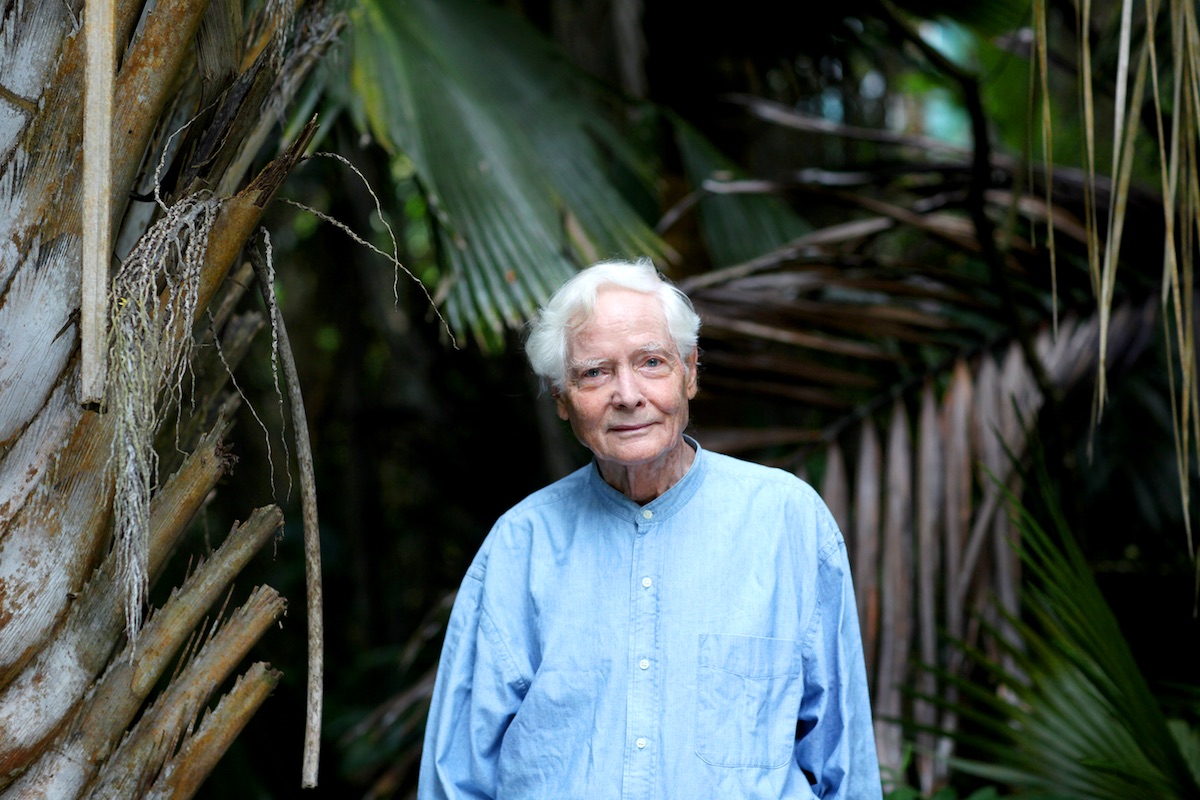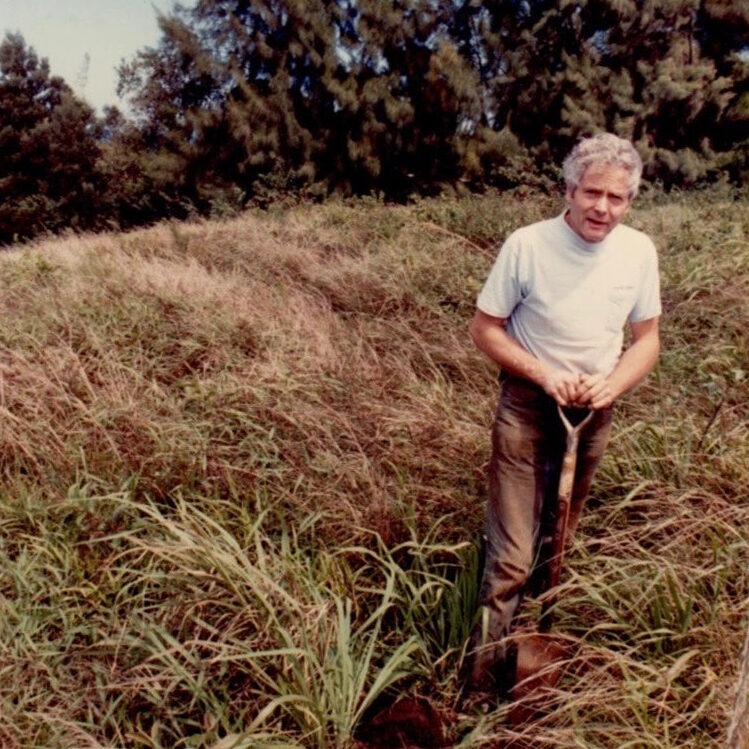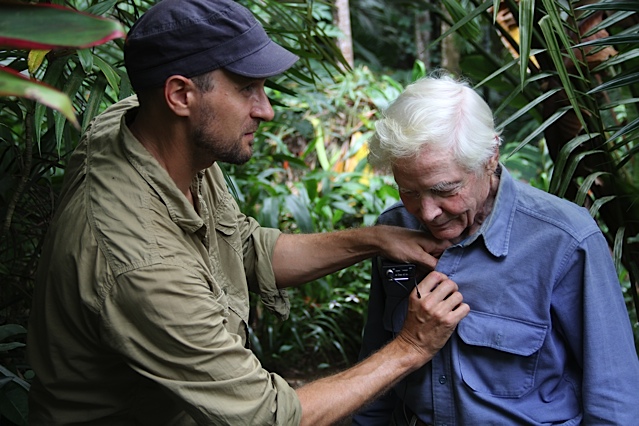
Appointed United States Poet Laureate by the Library of Congress in 2010, William Stanley Merwin had a career that spanned seven decades. A poet, translator, gardener and environmental activist, Merwin has become one of the most widely read and honored poets in America. He died at home at the age of 91, in the house he built, among the thousands of palms he planted, on Friday, March 15, 2019.
Born September 30, 1927, in New York City, William Stanley Merwin was the son of a Presbyterian minister, for whom he began writing hymns at the age of five. He was raised in New Jersey and Pennsylvania and attended Princeton University on a scholarship. As a young man, Merwin went to Europe and developed a love of languages that led to work as a literary translator. Over the years, his poetic voice moved from the more formal to a more distinctly American voice. As the Atlantic Monthly said, “The intentions of Merwin’s poetry are as broad as the biosphere yet as intimate as a whisper. He conveys in the sweet simplicity of grounded language a sense of the self where it belongs, floating between heaven, earth, and the underground.”
He has lived in Majorca, London, France, Mexico and several places in the United States, as well as Boston and New York. In 1976, Merwin moved to Hawaii to study with Robert Aitken, a Zen Buddhist teacher. He married Paula Dunaway, in 1983, and settled on Maui.
For over 40 years, they lived in a home that William designed and helped build, surrounded by acres of land once devastated and depleted from years of erosion, logging and toxic agricultural practices. Together, the Merwins painstakingly restored the land into one of the most comprehensive palm gardens in the world. He continued to live, write and garden in Hawaii until he died at home on Friday, March 15th, 2019. You may read a collection of remembrances here.

Accolades
In addition to the appointment as U.S. Poet Laureate in 2010, W.S. Merwin has been awarded the Pulitzer Prize (twice), the Bollingen Prize, the Tanning Prize, the Lilly Prize and the Lannan Lifetime Achievement Award. His Migration: New and Selected Poems won the 2005 National Book Award for Poetry and Present Company, which closely followed it, earned him the Bobbitt Prize from the Library of Congress.
Merwin has also translated both Dante’s Purgatorio and Sir Gawain and the Green Knight, for which he won the American Academy of Arts and Letters’ Gold Medal for Poetry and the Academy of American Poets’ Howard Morton Landon Translation Prize. In 1999, W.S. Merwin was named Poetry Consultant to the Library of Congress for a jointly-held position along with poets Rita Dove and Louise Glück. He has been honored as laureate of the Struga Poetry Evenings Festival in Macedonia, receiving the international poetry award, the Golden Wreath Award. He received the 1971 Pulitzer prize for Poetry for his collection The Carrier of Ladders, and the 2009 Pulitzer Prize for Poetry for The Shadow of Sirius, widely praised as one of his finest books and lauded by one reviewer as “the irreducible essence of his art.” The Kenyon Review Award for Literary Achievement was be awarded to Merwin in November 2010.

Documentary
The story of W.S. Merwin’s life was brilliantly told by Maui filmmaker Stefan Schaefer in the feature-length documentary Even Though the Whole World is Burning (2014, Cicala Filmworks). It is available to view on-demand here. It can also be purchased on DVD directly from the filmmaker.
Bibliography
His first book, A Mask for Janus, was chosen by W.H. Auden in 1952 for the Yale Younger Poets series. His book of poems The Carrier of Ladders was awarded the Pulitzer Prize in 1970. His other books of poems include The Drunk in the Furnace, The Moving Target, The Lice, Flower & Hand, Writings to an Unfinished Accompaniment, The Compass Flower, Feathers from the Hill, Opening the Hand, The Rain in the Trees, Travels, The Vixen, The Lost Upland, Unframed Originals, The Folding Cliffs, The River Sound, The Pupil, a translation of Dante’s Purgatorio and his critically-lauded translation of Sir Gawain and the Green Knight. His prose includes The Mays of Ventadorn, as part of the National Geographic Directions series, The Ends of the Earth (essays), and a memoir entitled Summer Doorways (Shoemaker & Hoard). Recent reissues of his books include The First Four Books of Poems, Spanish Ballads (Copper Canyon Press), his translations of Jean Follain’s poems Transparence of the World, and Antonio Porchia’s Voices, as well as The Book of Fables (Copper Canyon), a reissue of two previously published books The Miner’s Pale Children and Houses & Travelers.
His more recent poetry collections include Present Company (Copper Canyon, 2005), which won the Rebekah Johnson Bobbitt National Prize for Poetry, Migration: Selected Poems 1951-2001 (Copper Canyon, 2005), which won the National Book Award, The Shadow of Sirius (Copper Canyon, 2009), which was awarded the Pulitzer Prize (his second Pulitzer), and The Moon Before Morning (Copper Canyon, 2014). In 2016, he published two books: a photo book featuring Merwin’s essays and poems about his palm forest called What is a Garden? (University of South Carolina Press, 2016), and a new book of poems, Garden Time (Copper Canyon, 2016).
In 2017, Merwin’s publisher Copper Canyon Press released a collection The Essential W.S. Merwin, edited by his longtime poetry editor Michael Wiegers, spanning his entire lifetime of literary works in poetry, prose, and translation.

